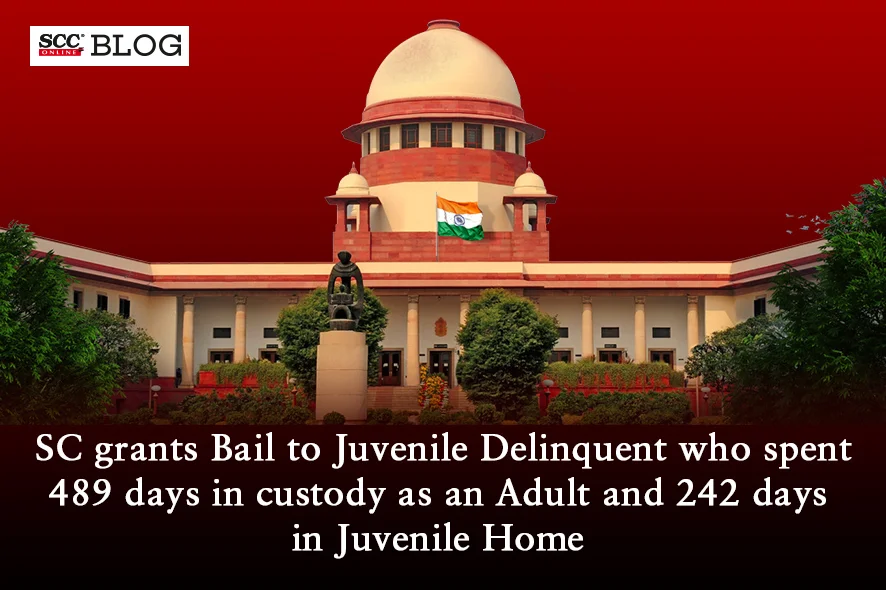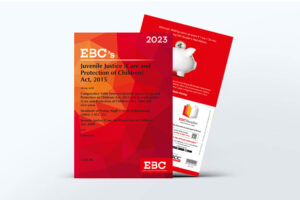Supreme Court: In a special leave petition (‘SLP’) under Section 136 of the Constitution of India filed against the Judgment and Order of the Rajasthan High Court, wherein an appeal against the order of the Special Judge, POCSO, denying bail to the minor/accused was dismissed for offences under Sections 363, 366-A, 368, 376 of Penal Code, 1860 (‘IPC’) and Section 3, 4, 16 and 17 of Juvenile Justice (Care and Protection of Children) Act, 2015 (‘JJ Act’), the Division Bench of A.S. Bopanna and Sudhanshu Dhulia, JJ., allowed the SLP and released the accused on bail.
In the matter at hand, the family of the accused and the victim had fixed their marriage, however, due to problems between their families, the marriage arrangement was broken. Since the accused and the victim had feelings for each other, they got married in a temple. The father of the victim had filed a complaint against the accused he was arrested on 29-04-2021. A Chargesheet was filed against the petitioner for offences under Sections 363, 366-A, 368, 376 of the IPC and Section 3, 4, 16 and 17 of the JJ Act. The accused had filed the first bail application before the Juvenile Justice Board under Section 12 of the JJ Act, however, it was dismissed by the Board. The accused had filed an appeal before the Special Judge, POCSO Cases, Kota and it was dismissed vide order dated 21-10-2022. The accused had filed a Criminal Revision Petition under Section 102 of the JJ Act before the High Court, however the same was dismissed by the High Court. Thereafter, the accused had preferred second bail application before the Juvenile Justice Board, and aggrieved by the dismissal of the same, the petitioner approached the High Court, wherein, the High Court vide impugned order dismissed the appeal of the accused. The accused was aggrieved that without looking into the facts and circumstances of the case and without appreciating the evidence on record, the High Court had dismissed the criminal revision petition.
The petition raised a question before the Court that whether a child in conflict with the law should be treated as an undertrial prisoner and deserves to be released after completing half of maximum period of detention as provided under Section 436-A of the Code Criminal Procedure, 1973. The accused person’s case was that he was being tried as an adult, even though he was a minor when he was arrested. He remained in prison for 489 days as an adult, from 29-04-2021 to 30-08-2022 and after 30.08.2022, he was tried by Juvenile Justice Board and was in Child Observation Home, Kota for 242 days since then.
Regarding the nature of the order passed by the High Court, the Court said that there was no need to go into all aspects of the matter at the present stage. However, the Court noted that the accused was in custody for more than two years, therefore, the Court allowed the petition and directed that the accused be released on bail subject to the appropriate conditions being imposed by the Trial Court. The Court also directed that the petitioner shall be produced before the Trial Court forthwith and an appropriate release order should be passed.
[V.K. (Juvenile) v. State of Rajasthan, 2023 SCC OnLine SC 841, Decided on 14-07-2023]
Advocates who appeared in this case :
For the Petitioner: Advocate on Record Namit Saxena, Advocate Awnish Maithani, Advocate Shivam Raghuwanshi.












It is heartening to see the judiciary recognizing the want to guard the rights of juveniles and make sure honest remedy in the prison system. Lengthy durations of pretrial detention can have extreme penalties on the intellectual and emotional well-being of younger individuals, doubtlessly impeding their probabilities of rehabilitation and reintegration into society.